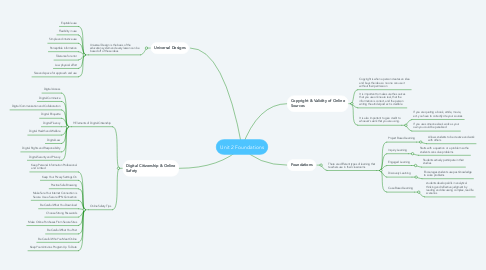
1. Universal Designs
1.1. Universal Design is the basis of the education system and every lesson can be based off of these ideas
1.1.1. Equitable use
1.1.2. Flexibility in use
1.1.3. Simple and intuitive use
1.1.4. Perceptible information
1.1.5. Tolerance for error
1.1.6. Low physical effort
1.1.7. Size and space for approach and use
2. Digital Citizenship & Online Safety
2.1. 9 Elements of Digital Citizenship
2.1.1. Digital Access
2.1.2. Digital Commerce
2.1.3. Digital Communication and Collaboration
2.1.4. Digital Etiquette
2.1.5. Digital Fluency
2.1.6. Digital Health and Welfare
2.1.7. Digital Law
2.1.8. Digital Rights and Responsibility
2.1.9. Digital Security and Privacy
2.2. Online Safety Tips
2.2.1. Keep Personal Information Professional and Limited
2.2.2. Keep Your Privacy Settings On
2.2.3. Practice Safe Browsing
2.2.4. Make Sure Your Internet Connection is Secure. Use a Secure VPN Connection
2.2.5. Be Careful What You Download
2.2.6. Choose Strong Passwords
2.2.7. Make Online Purchases From Secure Sites
2.2.8. Be Careful What You Post
2.2.9. Be Careful Who You Meet Online
2.2.10. Keep Your Antivirus Program Up To Date
3. Copyright & Validity of Online Sources
3.1. Copyright is when a person creates an idea and buys the idea so no one can use it without their permission
3.2. It is important to make sure the sources that you use online are real, that the information is correct, and the person writing the article/post ect is credible
3.3. It is also important to give credit to whoever's work that you are using.
3.3.1. If you are quoting a book, article, movie, ect. you have to correctly cite your sources
3.3.2. If you use someone else's work as your own you could be penalized
4. Foundations
4.1. There are different types of learning that teachers use in their classrooms
4.1.1. Project Based Learning
4.1.1.1. Allows students to be creative and work with others
4.1.2. Inquiry Learning
4.1.2.1. Starts with a question or a problem so the students can solve problems
4.1.3. Engaged Learning
4.1.3.1. Students actively participate in their studies
4.1.4. Discovery Learning
4.1.4.1. Encourages students use past knowledge to solve problems
4.1.5. Case Based Learning
4.1.5.1. students develop skills in analytical thinking and reflective judgment by reading and discussing complex, real-life scenarios
